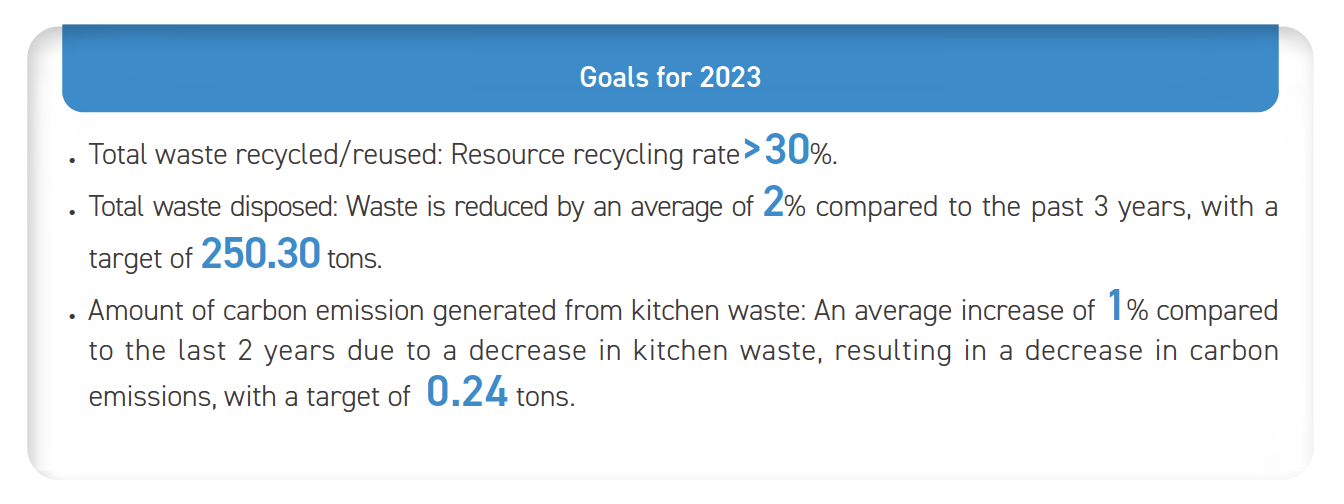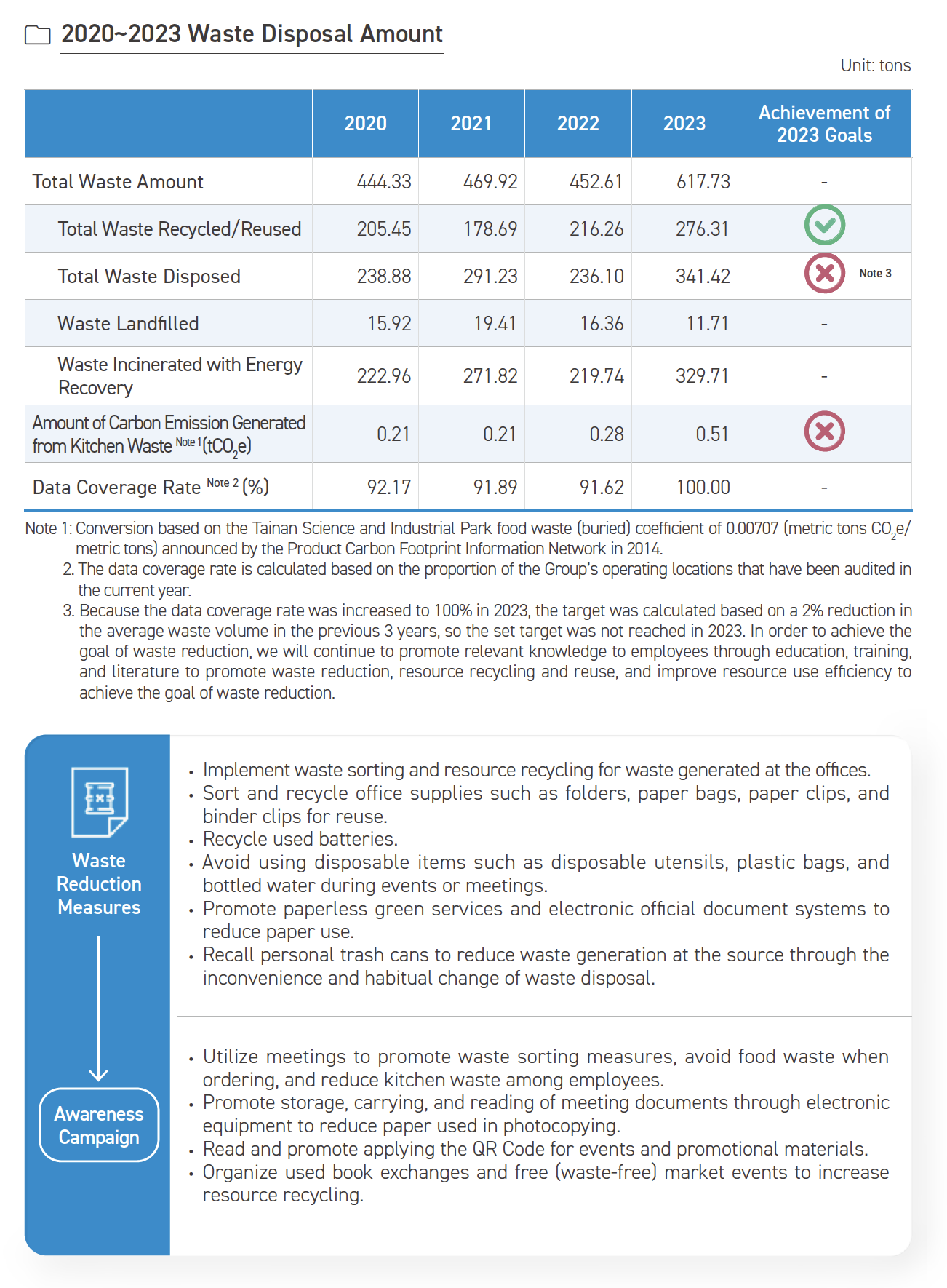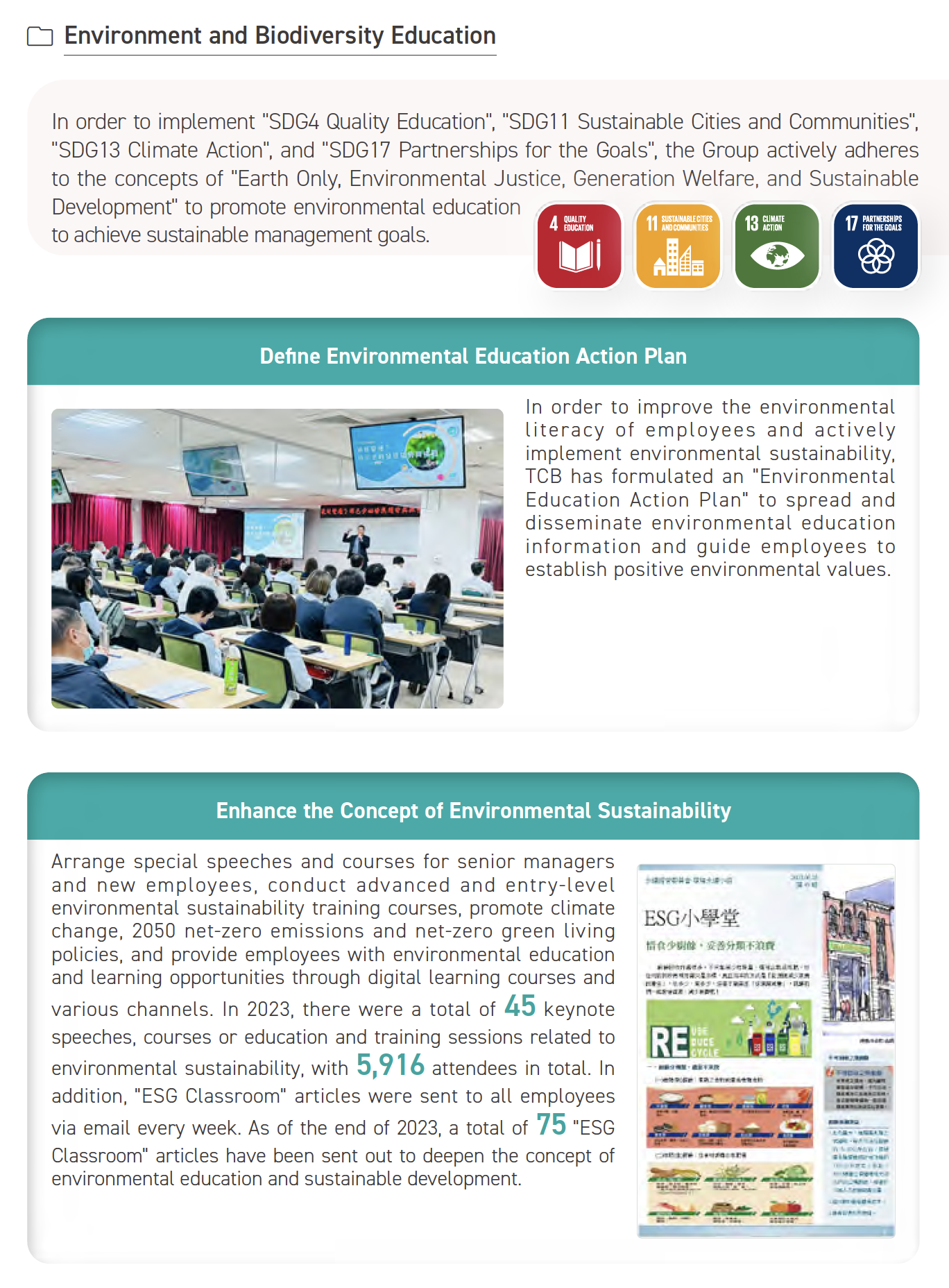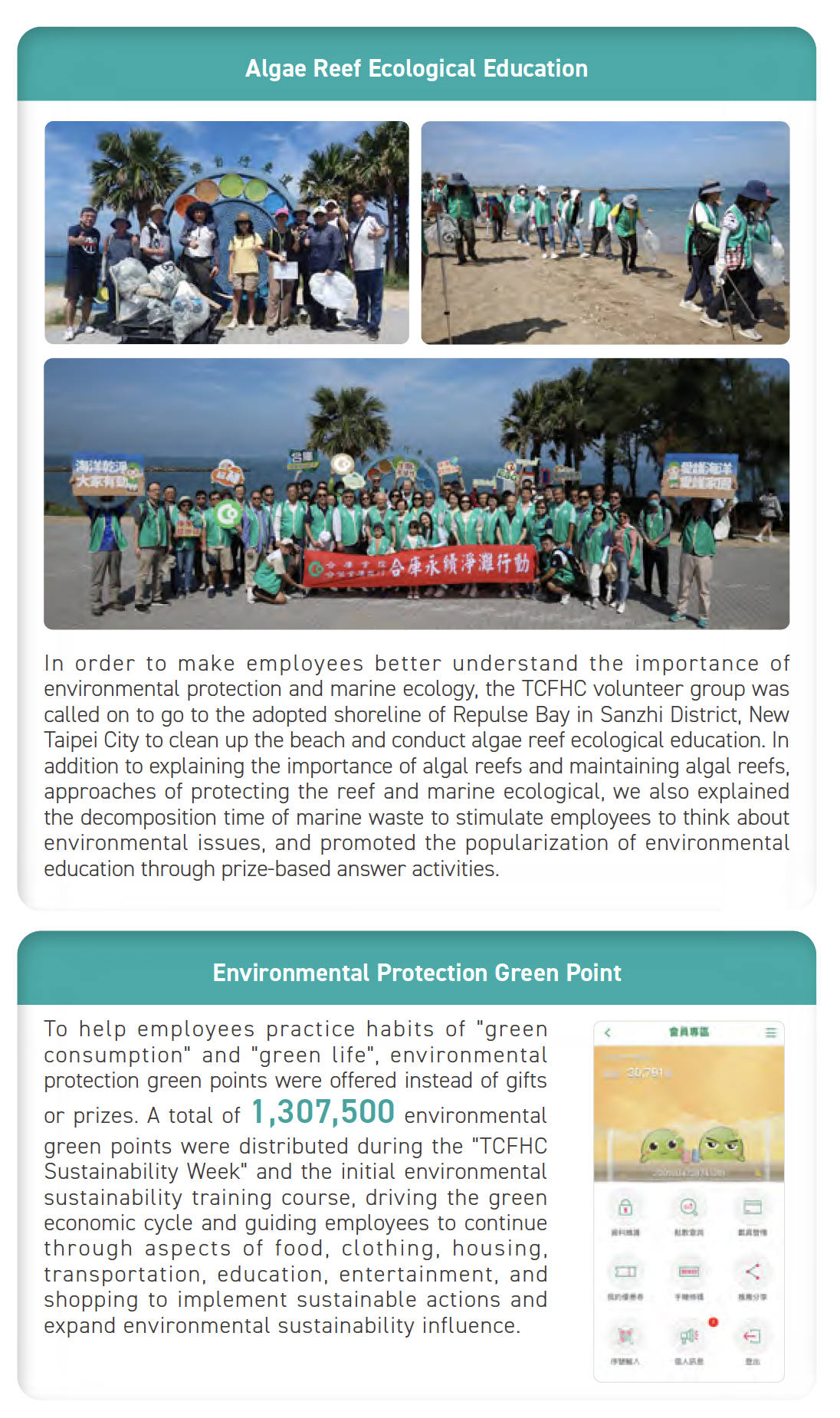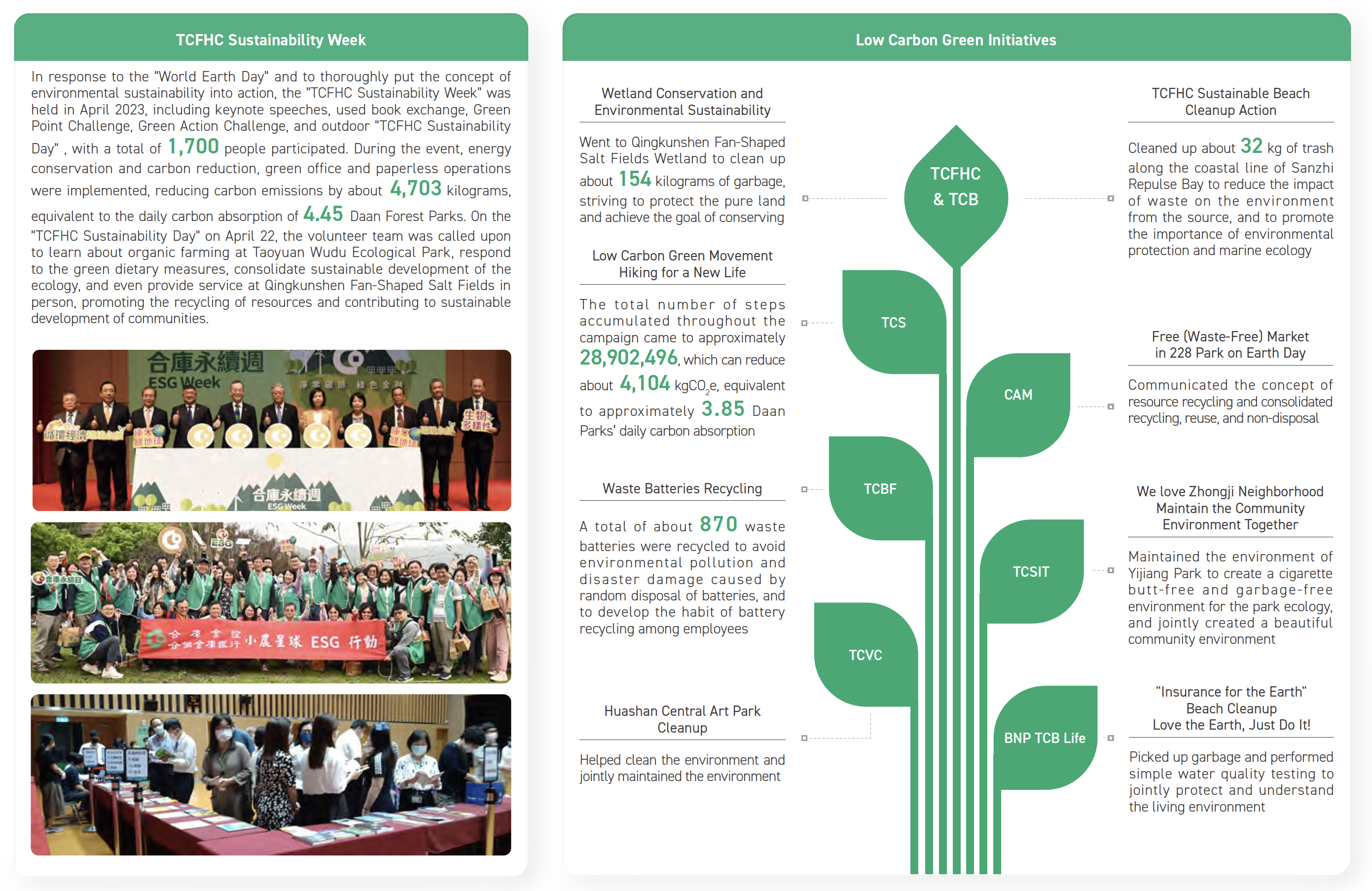In fulfillment of 2050 net-zero emission goal and SDGs, TCFHC implements green operations and reduces the impact of its business activities on the environment in 6 areas, which are "Energy Conservation and Carbon Reduction", "Energy Management", "Water Resources Management", "Waste Management and Circular Economy", "Environment and Biodiversity Education" and "Environment and Biodiversity Conservation". At the same time, TCFHC has set short-, medium- and long-term goals for environmental sustainability and improves energy-saving and carbon-reducing measures through tracking the implementation status every quarter and conducting review meetings every 6 months to improve management measures on a rolling basis.
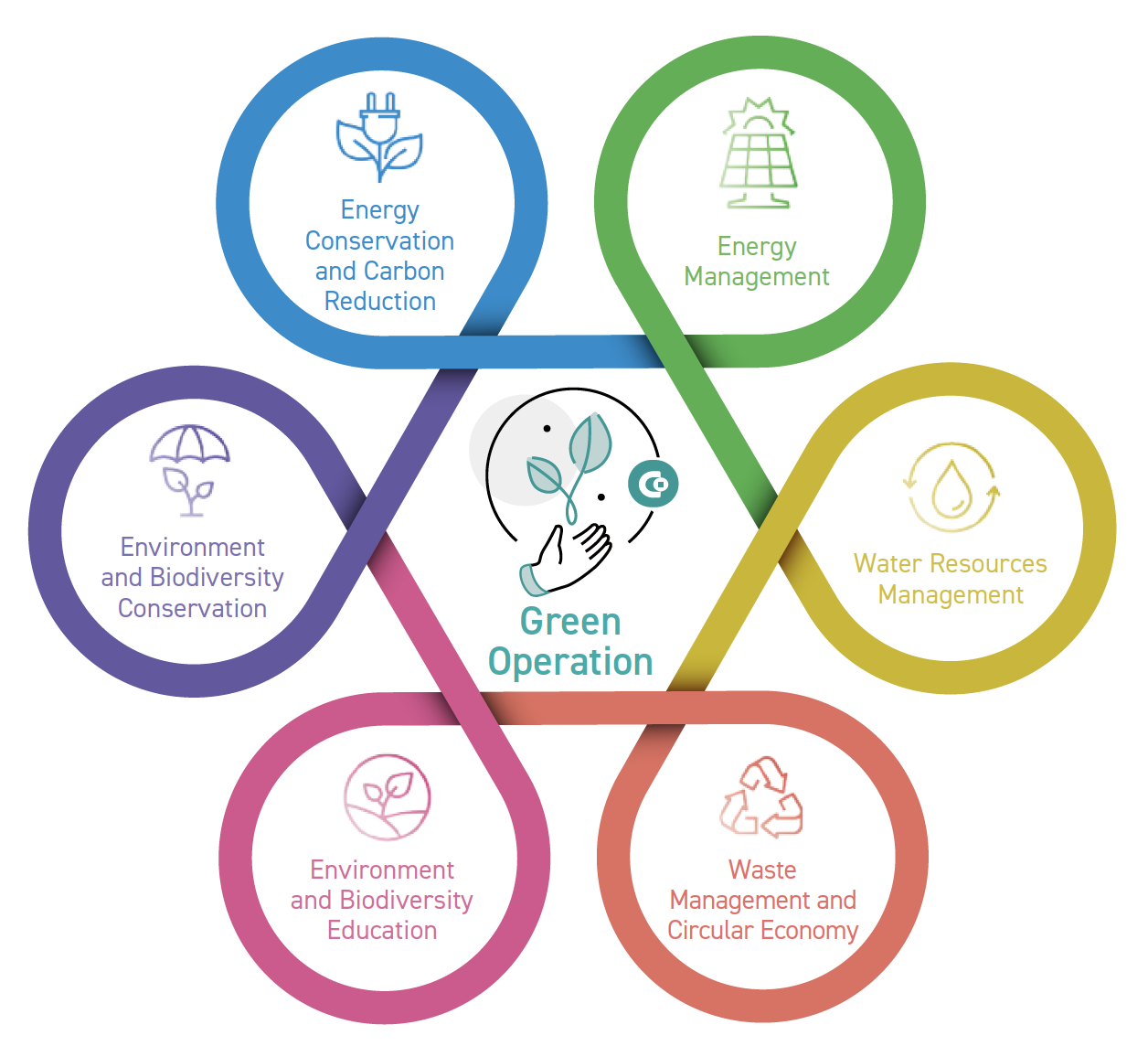
To deepen environmental sustainability efforts, TCFHC established the Environmental Sustainability Task Force under the Sustainable Development Committee. TCB, on the other hand, became the 1 st state-owned bank to set up the "Environmental Sustainability Section" under the Administration Department to take charge of the Environmental Sustainability Task Force of TCFHC. We use a vertical integration model to plan environmental sustainability affairs, scheme to mitigate or adapt to the impact of climate change, and implement the Group’s low-carbon operations.
Facing the impact of global warming and climate change, TCFHC commits to implement environmental sustainability, fulfills the environmental protection responsibilities, and formulates the " Environmental Sustainability and Energy-Related Policies " as a way to set environmental and energy goals and establish corporate green culture, implement green procurement and strengthen the understanding of sustainable development. We actively respond to the carbon emission reduction path, integrate with the international net-zero trend, and enhance climate change resilience.
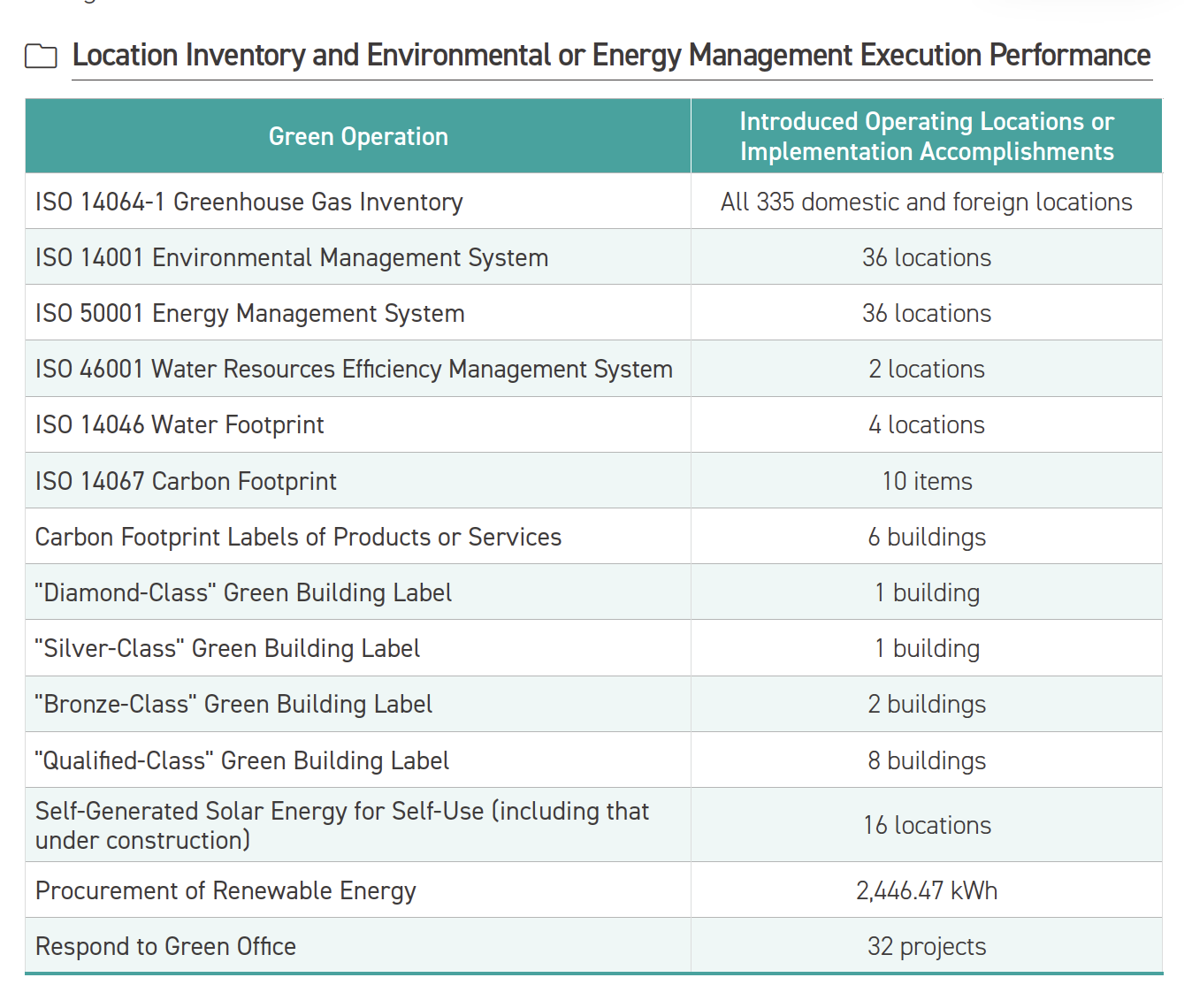
Energy Conservation and Carbon Reduction
Over the past few years, global warming has changed the ecological environment and frequent extreme weather incidents are threatening human survival as well. If we continue to ignore the imminent crisis and keep on with unstrained resource consumption, climate change will get worse and eventually lead to irreversible damages to the ecosystem. For the sake of mitigating impacts of climate change, TCFHC proactively manages greenhouse gas emissions and is devoted to joining the crew of controlling global warming within 1.5°C. We use the verification results of completing the "ISO 14064-1 Greenhouse Gas Inventory" at a total of 333 locations domestically and abroad in 2021 as the base year to set SBT, and passed the goal review in 2023. The Group’s own operations (Scope 1 plus Scope 2) will reduce absolute emissions by 50.4% in 2032 compared with the base year (2021), with an average annual decrease of 4.58%. Therefore, the reduction goal in 2023 is 9.16% compared with 2021. In addition, TCFHC has implemented energy conservation and carbon reduction through the introduction of multiple ISO international standard verification and internal carbon pricing mechanisms, promoted green procurement and green offices, obtained green building labels, and combined with government energy-saving diagnostic services and other measures to practice energy conservation and carbon reduction. Meanwhile, we actively internalize the external costs of greenhouse gas emissions, strengthen the identification and management of risks and opportunities related to carbon emissions, and make strides towards low-carbon and sustainable operations.
GHG Emissions
In order to keep track of greenhouse gas emissions throughout the Group, "ISO 14064-1 Greenhouse Gas Inventory" verifications were conducted at all domestic and overseas locations and were completed in a total of 335 locations in 2023, covering Scopes 1-3 of carbon emissions. Greenhouse gas emissions of Scope 1 plus Scope 2, in particular, decreased by approximately 18.9% from the base year (2021), achieving the goal of 9.16% reduction. At the same time, TCFHC participates in the Carbon Disclosure Project (CDP) every year, actively takes actions to solve environmental problems, has obtained the "B List Management Level" for 3 consecutive years, and has introduced "ISO 14001 Environmental Management System", "ISO 50001 Energy Management System" and " ISO 46001 Water Resources Efficiency Management System" to effectively manage the consumption of various resources and reduces carbon emissions through the cycle of Plan - Do - Check - Act.
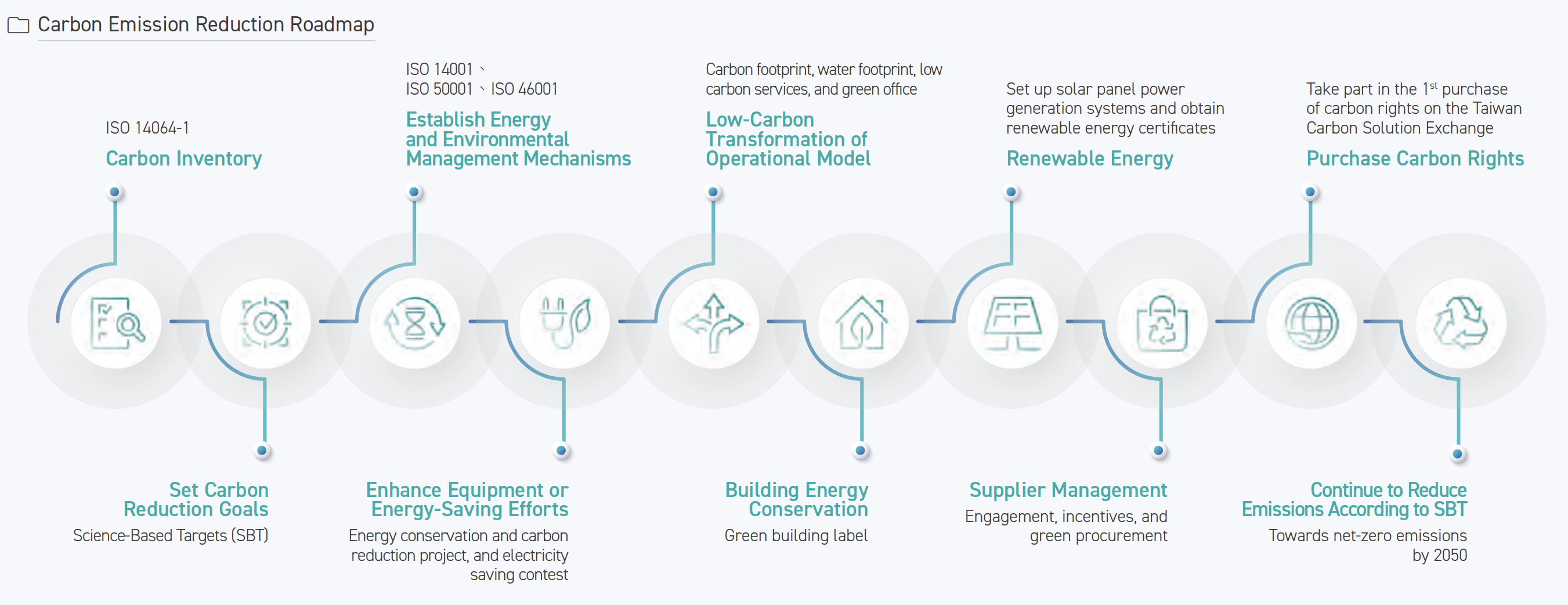
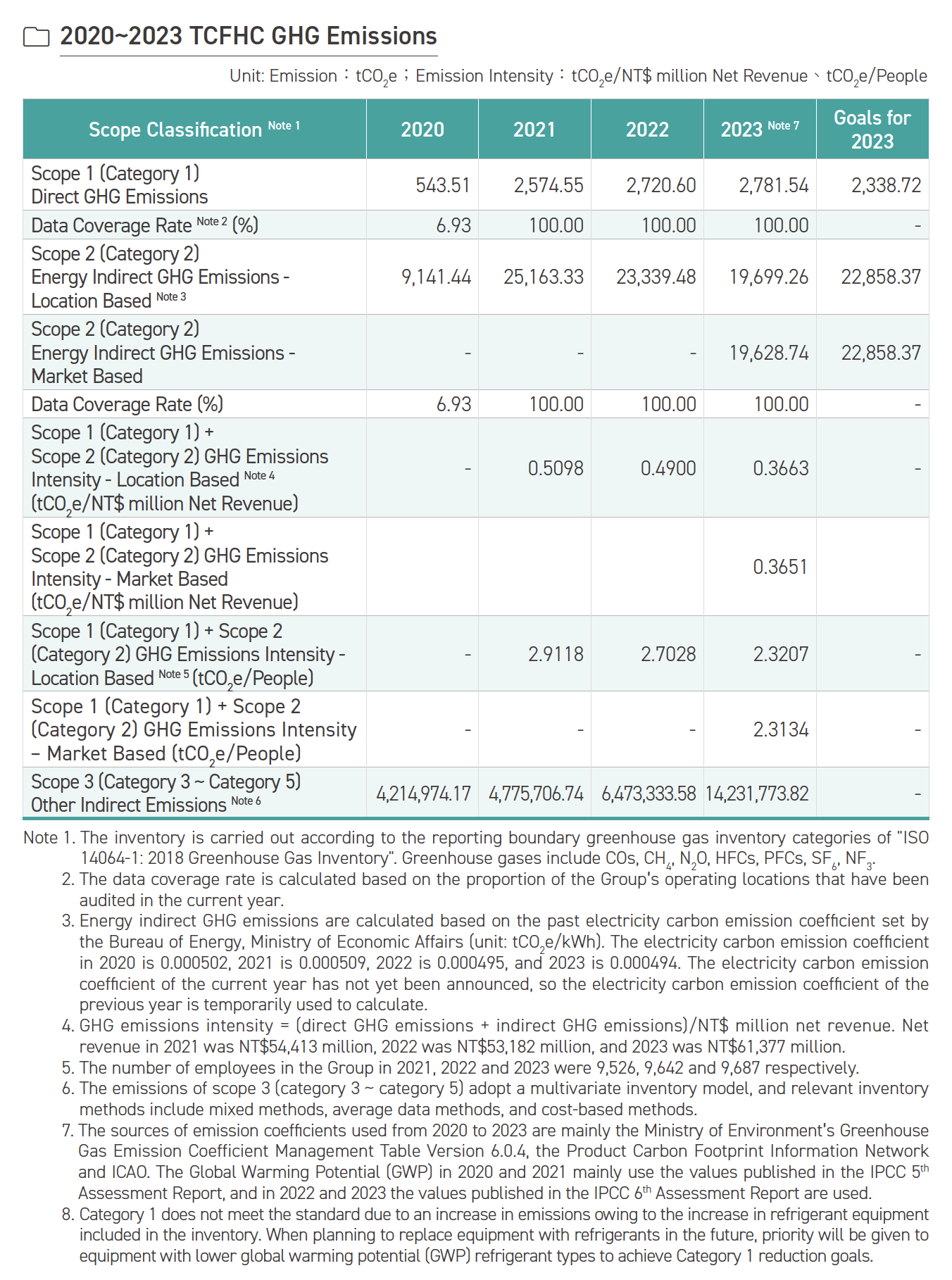
The Group’s Scope 3 inventory categories in 2023 include 12 categories. The Scope 3 categories verified by third parties include the purchased products and services, fuel-and energy-related activities, upstream transportation and distribution, waste generated in operations, business travel, downstream transportation and distribution, use of sold products, and end-of-life treatment of sold products. In addition, the Group has also set a reduction goal for business travel (domestic high-speed rail and domestic and overseas airlines), which will be reduced by 3% each year compared with the previous year.
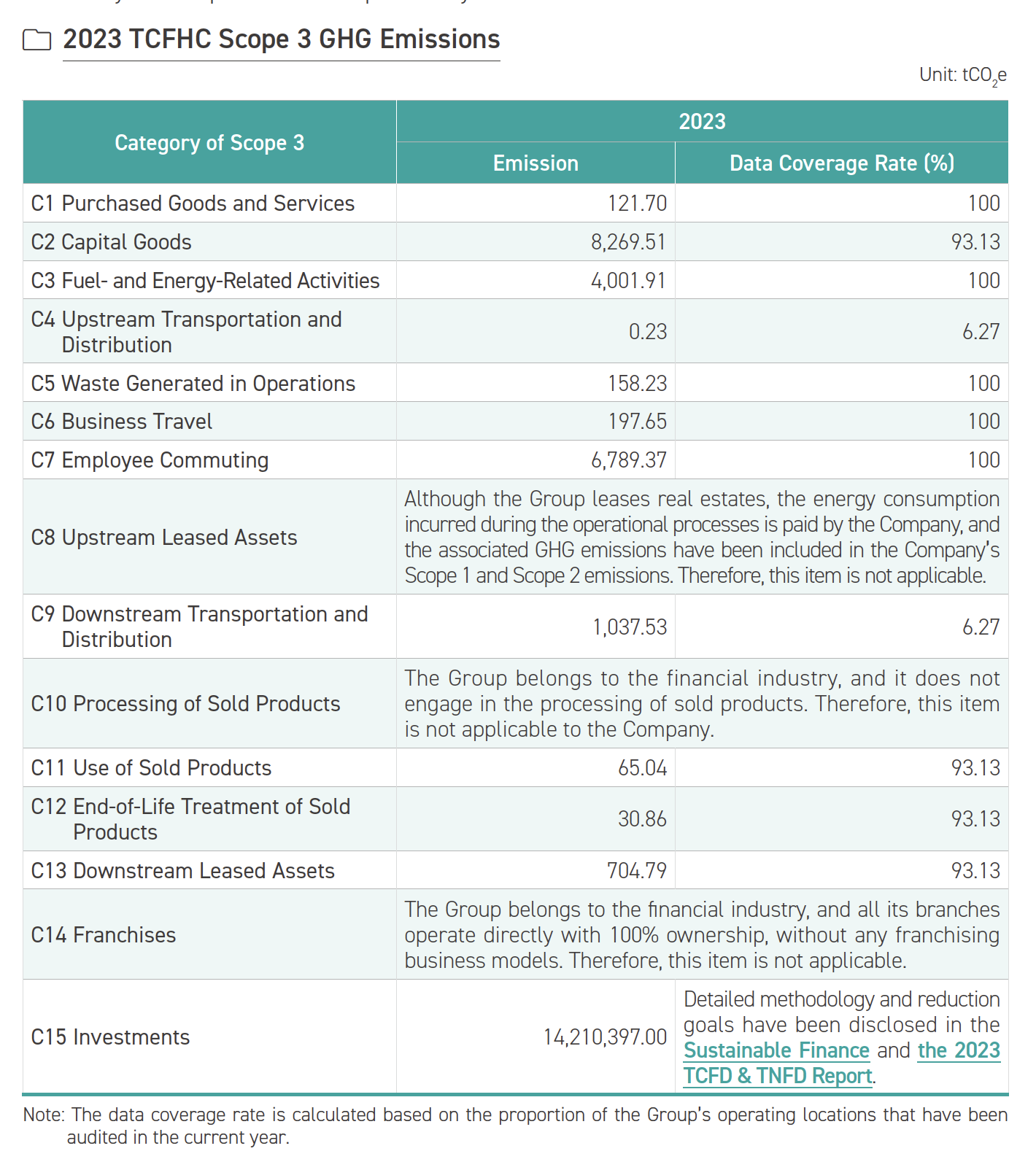
Performance of Energy Conservation and Carbon Reduction
In 2023, major projects that were implemented included "Energy Conservation and Carbon Reduction", "Replacing and Reducing Lighting Fixtures", and "Air-conditioning System Energy Conservation Improvement". Through improving software and hardware equipment, adjusting management models and strengthening employees’ environmental awareness, TCFHC promotes Employees implement energy conservation and carbon reduction in daily office work and do something for the earth.
A total of NT$7.63 million was expected to be invested in energy conservation and carbon reduction projects in 2023 and saved a total of 2,257,232 kWh in power consumption, reducing carbon emissions by about 1,117.30 tCO 2 e, which was equivalent to the annual carbon sequestration of 2.89 Daan Parks Note 1 . It was estimated that about NT$7.79 million to be saved. The average payback period was 0.98 years Note 2 .
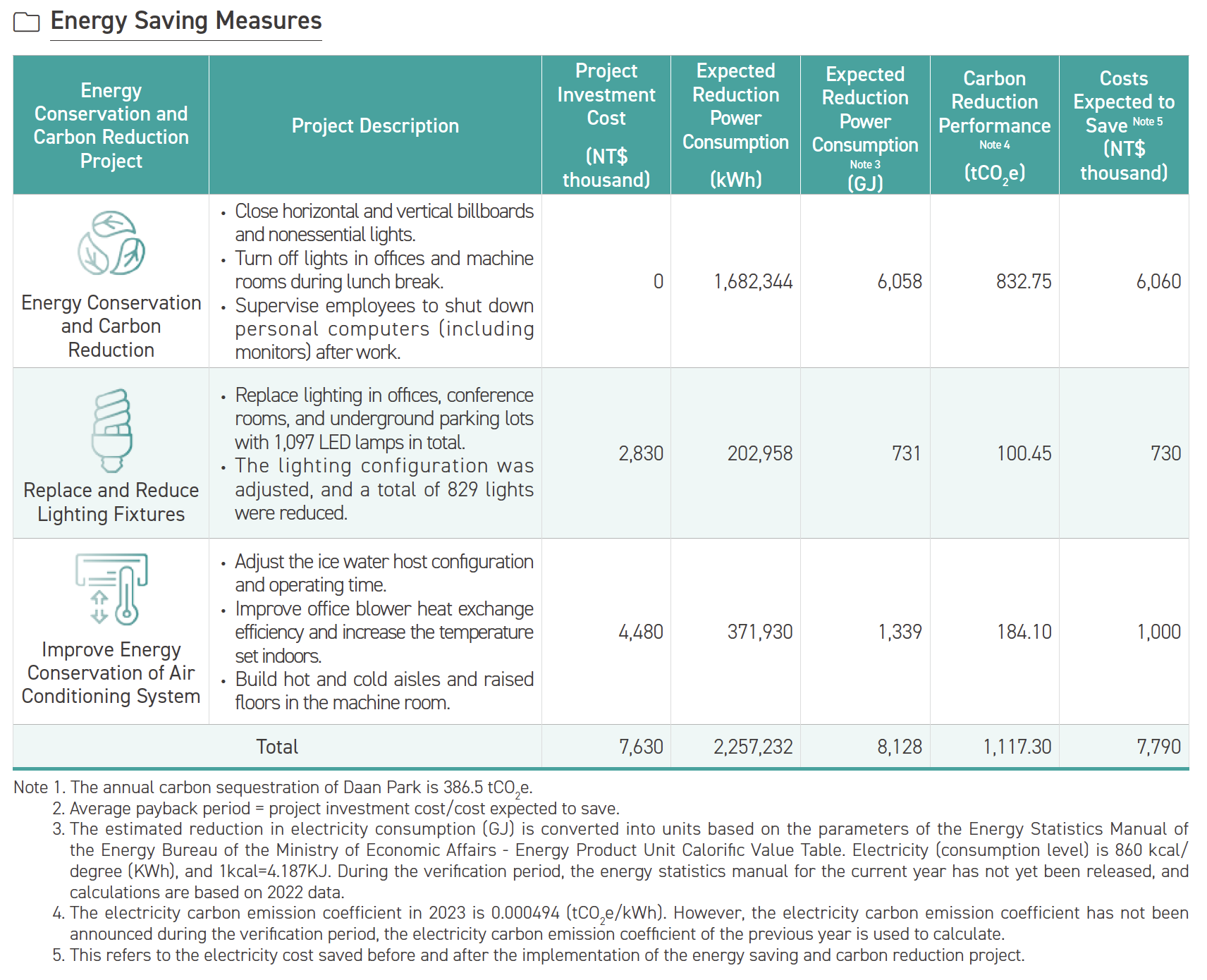
Internal Carbon Pricing
In order to implement carbon reduction management and strengthen the concept of "carbon emission has a price", TCB calculated Internal Carbon Pricing (ICP) in 2022 to examine the carbon generated by operations through the internalization of the "external cost" of greenhouse gases. Emission costs should be included in the investment considerations of future energy-saving and carbon-reduction projects, to enhance corporate carbon risk management capabilities and strengthen their own climate resilience. At the same time, TCB actively adopt low-carbon operating measures and improve energy use efficiency to further achieve energy-saving and carbon-reduction management benefits. TCB adopts the implicit pricing method and calculates ICP making reference to the energy-saving efficacy, purchase cost, and estimated service life of equipment purchased and reviews the ICP on a rolling basis each year. The average carbon price ranges from NT$4,279 to NT$7,814 per ton.
Participate in the 1 st Purchase of Carbon Rights
In order to proactively enforce carbon reduction and to support national climate actions, TCFHC spontaneously takes part in the trading of 1 st batch of carbon rights of the Taiwan Carbon Solution Exchange. The purchased carbon rights will be used to promote carbon reduction and carbon neutrality of the Group and its subsidiaries. Through the purchased carbon rights plan, TCFHC promotes the achievement of a number of SDGs, and while reducing corporate carbon emissions, TCFHC also realizes universal values such as social inclusion and climate equity.
Carbon Footprint and Carbon Label
In order to achieve a sustainable consumption and service model of a low-carbon economy, the life cycle assessment method is adopted to add transparency to the input-output of the product supply chain and services, energy and resources, and sources of carbon emissions with potential environmental impacts. Cumulatively by the end of 2023, the Group was approved upon "ISO 14067 Carbon Footprint" external verification of 10 items in total and acquired the verification statement. Among them, product or service carbon labels were received for 6 items, namely, TCB’s "World Card", "LOHAS Card", "Head Office (Business Department) Counter Service", "Financial Online Service/Online Banking Front End - General Login Overview", CAM’s "Self-owned Real Estate Sales Service", and BNP TCB Life’s "Personal Insurance Service Policy". In the future, TCFHC will continue to examine the carbon emission hotspots of operating products or providing services, optimize energy conservation and carbon reduction actions, and adjust or transform into low-carbon operations or service models.
Green Building
The headquarters building of TCB was built featuring the 4 major emphases of a green building, that is, "ecology, energy conservation, waste reduction, and health", with introduction of respective environmentally friendly and energy-saving designs that are in line with green buildings. In 2018, it obtained the Green Building Silver Label from the Ministry of the Interior and has been devoted to construction of green buildings in more additional locations for the sake of letting the building design belief in sustainable development live on and fulfilling the vision of co-existing and co-prospering with the earth. As of the end of 2023, the green building label has been obtained for 12 locations, including 1 diamond, 1 silver, 2 bronze and 8 qualified levels.

Energy Management
In order to reduce various energy consumption, TCFHC introduced the "ISO 50001 Energy Management System" and through various spontaneous action plans and improvement solutions, is devoted to energy conservation, energy creation, and energy purchase, improve energy efficiency and the proportion of renewable energy in use, achieve energy conservation goals, and fulfill the responsibility of protecting the environment.
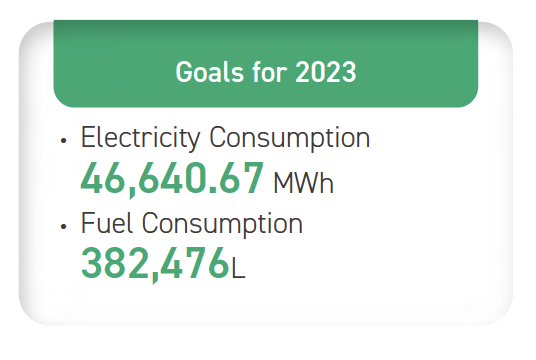
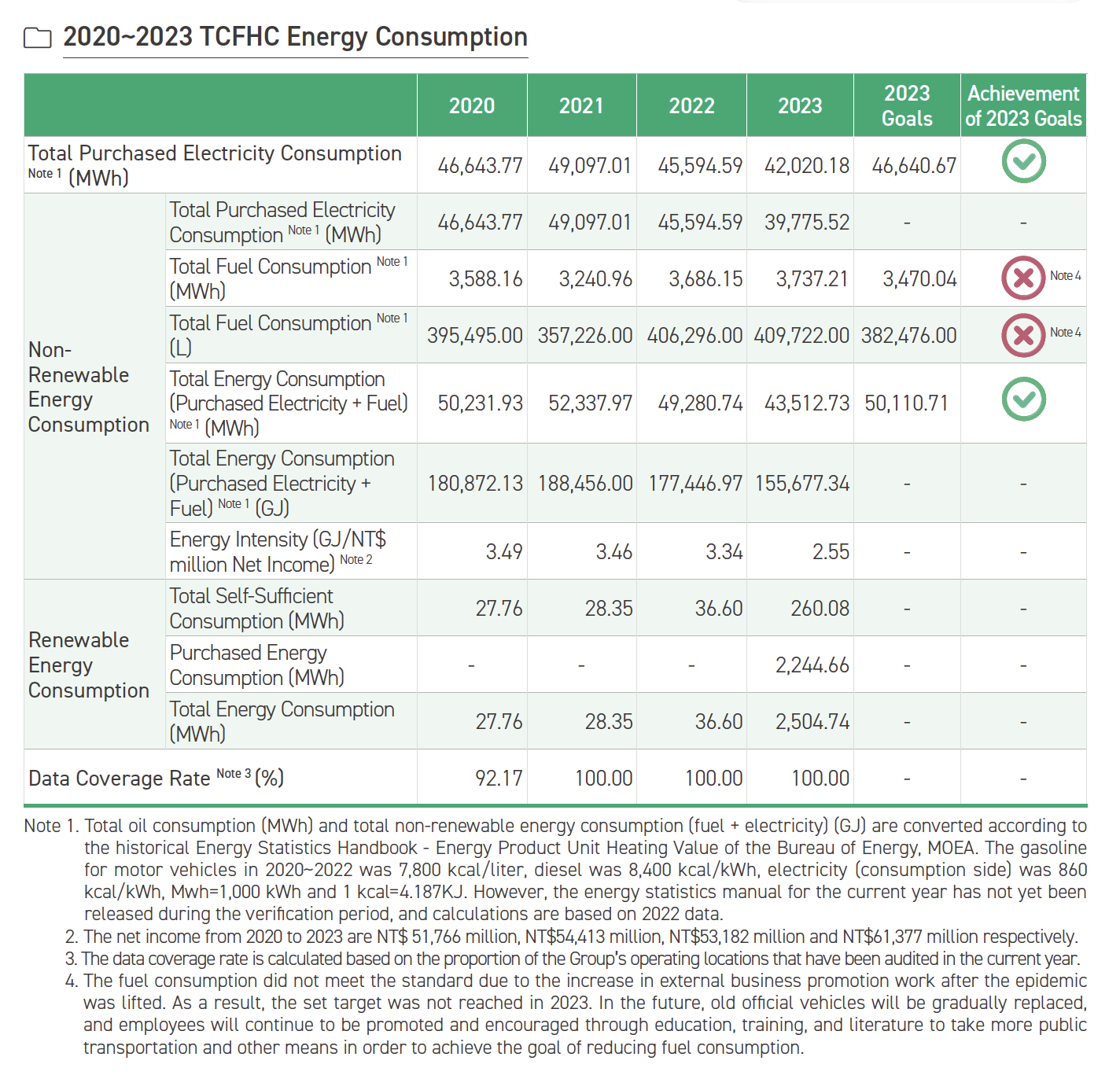
Energy Consumption Management
In order to achieve power-saving goals and reduce carbon emissions, in addition to actively promoting various energy-saving and carbon-reduction projects, power-saving measures and implementing green offices, TCB has formulated the "Business Unit Electricity Saving Competition Incentive Measures" in 2023. Based on the electricity consumption reduction targets of all business units in Taiwan, the unit will be ranked based on the unit's energy saving and annual reduction target achievement rate, and will be awarded from NT$6,000 to NT$60,000. In 2023, the electricity consumption of domestic business units was 24,545,805 kilowatt hours, a decrease of 1,739,463 kilowatt hours compared with 2022, with a power saving of 6.6%. The reduced carbon emissions converted from electricity consumption are 861 tCO 2 e Note , which was equivalent to the annual carbon absorption of 2.23 Daan Parks quantity.
Note: The electricity carbon emission coefficient in 2023 is 0.000494 (tCO 2 e/kWh). However, the electricity carbon emission coefficient has not been announced during the verification period, the electricity carbon emission coefficient of the previous year will be used to calculate.
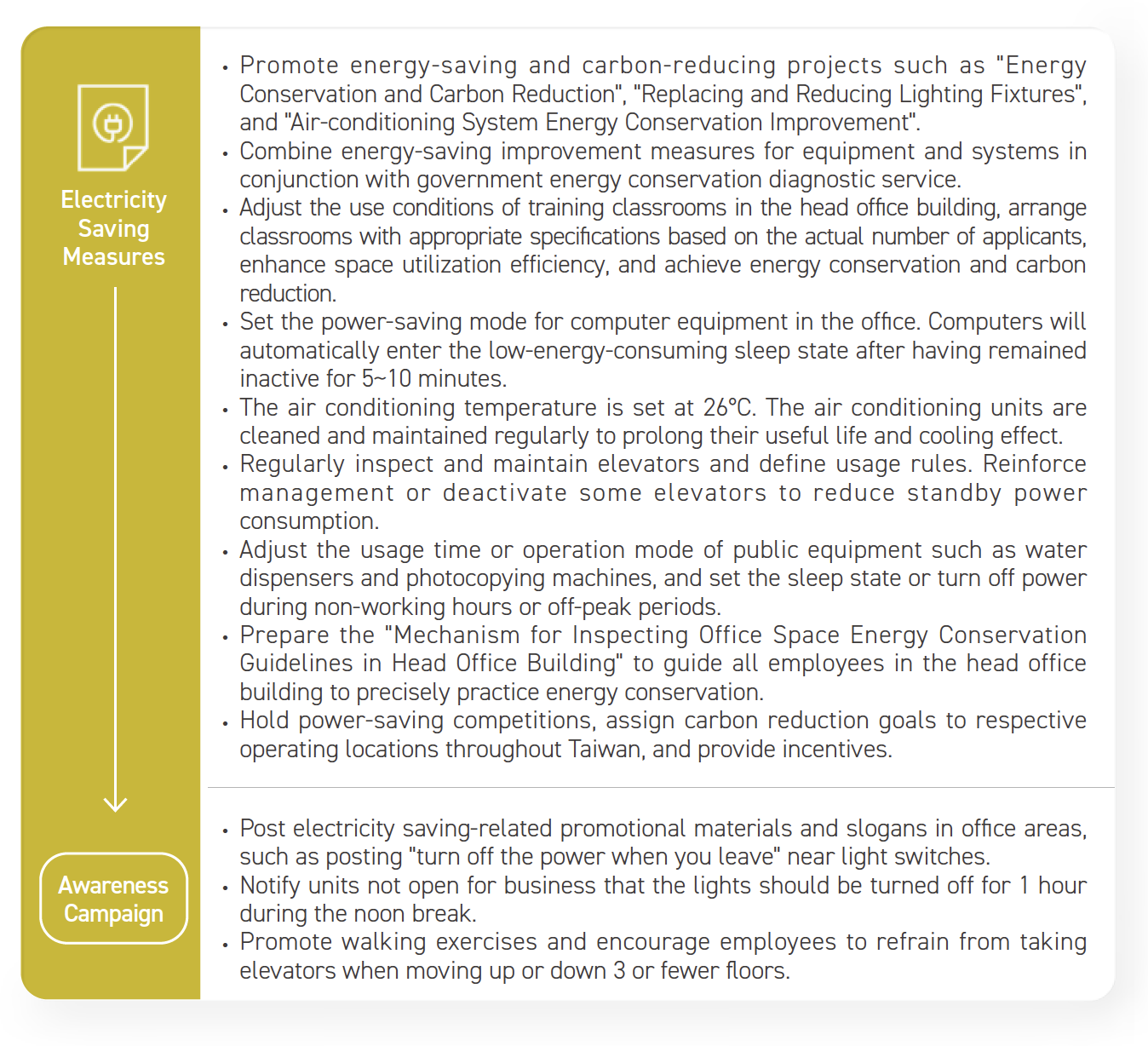
Use of Renewable Energy
In line with the government’s 2050 net-zero emission and the promotion of energy transformation policies, 11 locations of TCB have completed the installation of solar panel power generation systems. The actual total power generation has reached 260,082 kWh, and the reduced carbon emissions are about 128.74 tCO 2 e, which is equivalent to the annual carbon absorption of 0.33 Daan Parks. With the ongoing construction of solar panel power generation systems in another 5 locations, solar panel power generation systems accumulatively are now available in 16 locations, with an annual power generation of about 503,400 kWh. In addition, we purchased 24.4647 million kWh renewable energy. All together, the carbon emissions reduced are about 12,359 tCO 2 e, which is equivalent to the annual carbon absorption of 31.98 Daan Parks. In 2023, a total of 2.2447 million kWh of green electricity was transferred and 2,250 renewable energy certificates were obtained to respond to the "National Net-zero Emission Policy" in the future and to gradually increase the ratio of renewable energy used.
Fuel Management
In order to enable employees to practice green office in daily life, we gradually replace old official vehicles and motorcycles with high-efficiency and low-fuel-consumption official vehicles and electric motorcycles. Since 2022, a total of 202 environmentally friendly or energy-certified vehicles have been leased for official use. Meanwhile, we continue to promote the principle that employees should use public transportation instead of cars and motorcycles when commuting or traveling on business, or that employees should share rides when dispatching official cars, and encourage to use video conferencing instead of on-site meetings or training meetings to reduce energy and resource consumption and reduce carbon emissions.
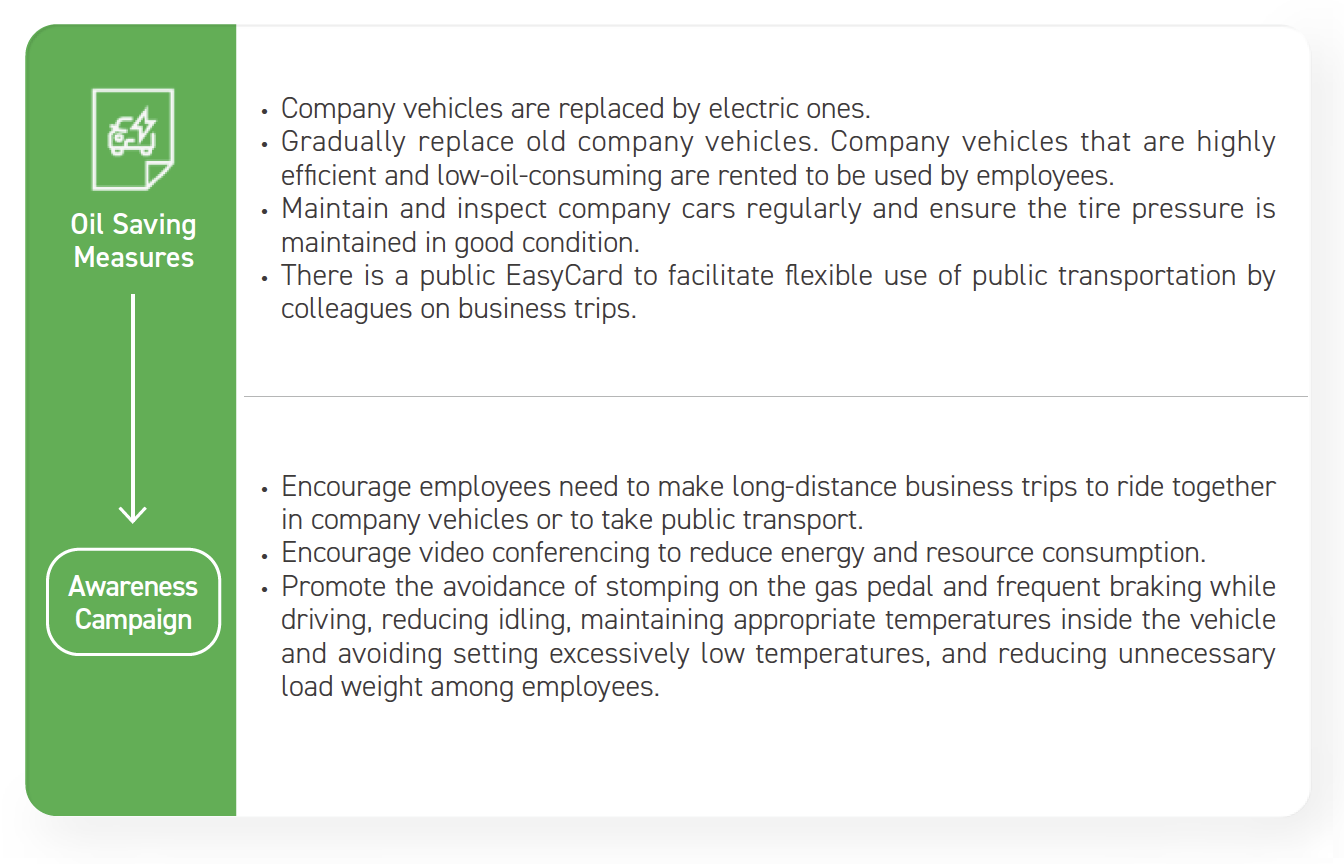
Water Resources Management
Global climate change has led to the issue of water scarcity, which is getting worse each day. Responding to "SDG 6 Clean Water and Sanitation", the head office building, IT Department, staff training center, and central processing center of TCB are verified for "ISO 14046 Water Footprint". The water footprint impact analysis helps boost water resource utilization efficiency, reduce environmental impacts concerning water throughout the life spans of products or services, and optimize water resource management.
In order to continuously reduce water consumption, the head office building and IT Department of TCB introduced the "ISO 46001 Water Resources Efficiency Management System" for the 1 st time, looking for opportunities to recycle water and improve major water facilities, and improve water utilization efficiency through reduction, replacement, and reuse, fulfilling the goal of conserving water.
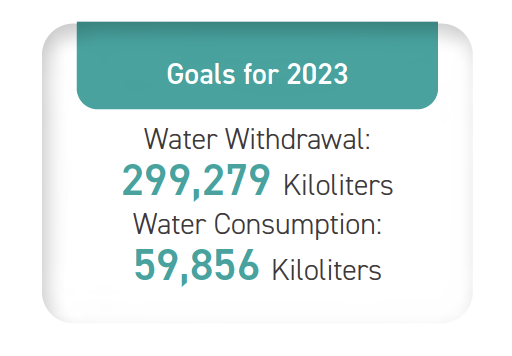
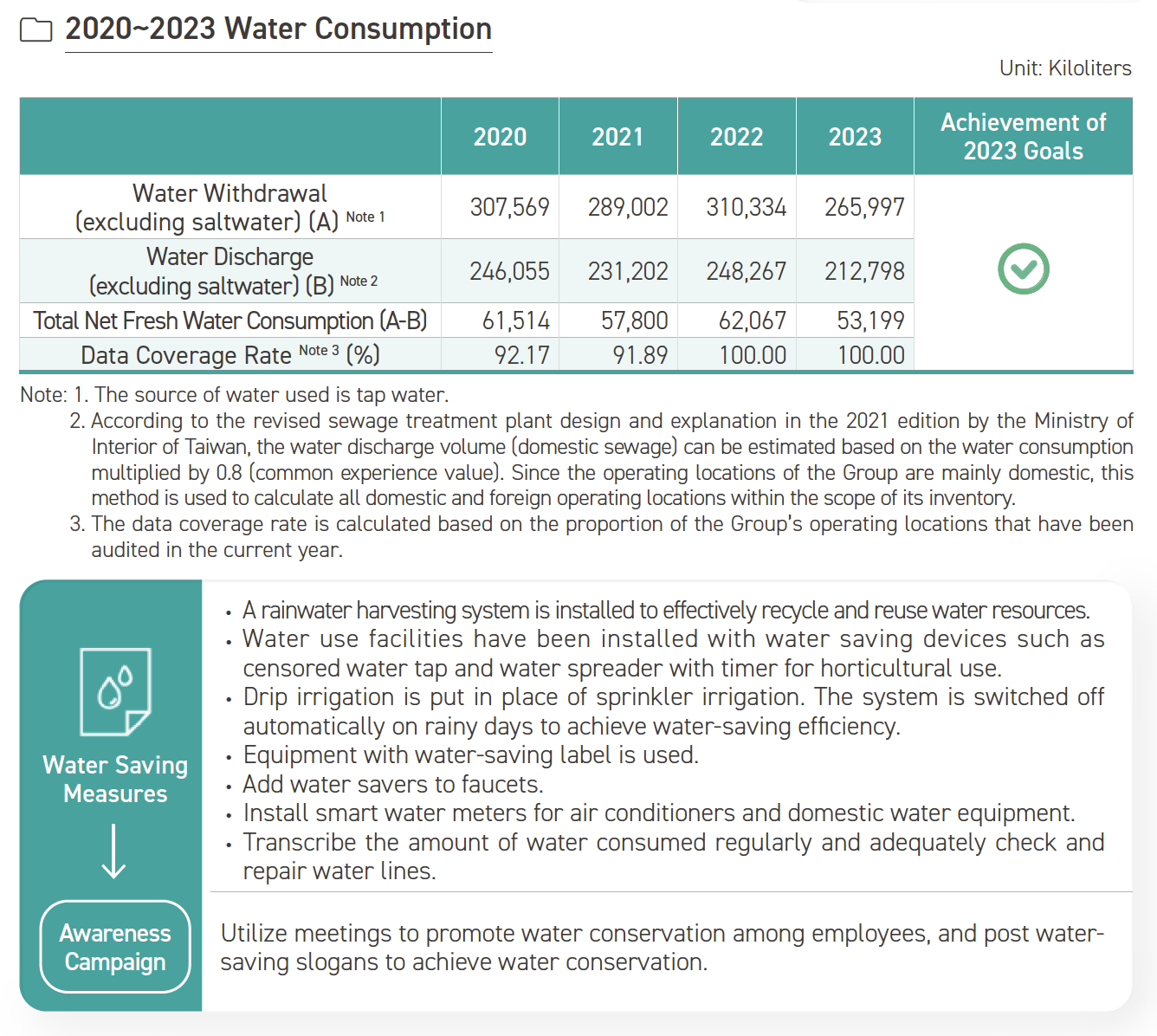
Waste Management and Circular Economy
To reduce the environmental negative impact and achieve resource sustainability, TCFHC has implemented "ISO 14001 Environmental Management System" and formulated waste management measures to promote circular economy through resource recycling, green procurement and rent instead of buying. In addition to practicing the 3R environmental protection policy, which is reduce, recycle, and reuse, increasing the benefits of waste recycling and reuse, TCFHC also purchases environmentally friendly products, green building materials, and recyclable products with environmental protection, energy-saving, and water efficiency labels approved by the government.
In addition, in order to enhance the concept of circular economy and resource sustainability among employees, we continue to communicate knowledge on how to reuse resources, reduce unnecessary spending, bring down waste, and enhance resource utilization efficiency in relevant conferences and educational trainings. By exchanging used books, recycling waste battery, and free (waste-free) market activities and beach cleanup, among other volunteer activities, we promote reduction of waste from the source and encourage extension of the life spans of artifacts and improve resource utilization efficiency and recycling to significantly reduce the negative impacts that waste may have on the environment.
